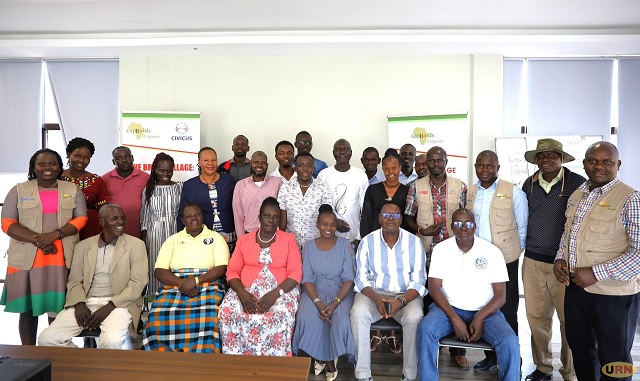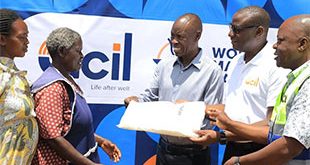
Moroto, Uganda | THE INDEPENDENT | Civil Society Organizations in the Karamoja sub-region have demanded direct engagement with the donor community and localization of humanitarian programs.
According to the CSOs, this would enable them to strengthen their organizational structures and access direct funding to implement their development interventions. The dialogue would also help the donors to listen from both local actors and the district NGO monitoring committees.
Richard Omoding, the Executive Director of RiamRiam Civil Society Network said that they want space for dialogue between the donor community and district NGO monitoring committees.
Omoding applauded the mode that the Royal Danish Embassy used by engaging the local government, local actors, and each relevant sector that contributed to the development of Karamoja.
Omoding observed that the ambassador did not read research but instead stepped on the ground to engage every relevant sector that contributed to the development of the Karamoja.
Through this engagement, Omoding confirmed that the local organizations are now receiving the grants directly from the Royal Danish Embassy without sub-granting.
Omoding reiterated that they are looking forward to having such a platform where the donor community has an interface with the district NGO monitoring committees so that they can advise on the priorities of development challenges in the region.
He urged the local leadership project to orient the NGO monitoring committees, and the Community Development Officer on the localization and build capacity to deal with the donor intermediaries. This would help to bridge the gaps where a lot of money is injected into the region with not much impact of the interventions.
Omoding emphasized the need to build the capacity of the CDOs being the spokesperson of NGOs so that they help identify the priorities of the locals. He added that they understand the real challenges in the region since they are the foot soldiers to avoid cases of funding failed projects.
Rosewell Paul Ilukol, the Executive Director of the Regional Pastoralists Initiative for Development based in the Nabilatuk district said that the local organizations within the region can address the challenge affecting the community if supported with resources.
Ilukol asserted that they are ready to spearhead their challenges rather than giving national donors who may incur more resources for operations and impact less in the community.
He added that the resources used for buying operational equipment such as motorcycles cars and others instead of channeling directly to the interventions in the community.
Ilukol said that the local organizations are the drivers of the community challenges and they are in a better position to address them.
He urged the donors to consider supporting the local community-based organizations if they are to achieve the goals of sustainable development.
Margy Lolem, the Moroto District Community Development Officer, said that the project will help the local actors link directly to the donors for better implementation of the programs.
Lolem urged the partners to cooperate and ensure they adhere to the standards and conditions of the project implementation. She revealed that the government has empowered community development officers through capacity building on how to monitor and regulate the partners in the sub-region.
She observed that the local organizations have always faced challenges of delays in funding from donors which affects the implementation process and achieving value for money.
Lolem said that the predetermined position of the donors while allocating resources has affected most variable programs in the community. She said that the donors should be flexible and able to adjust at any point considering the major issues in the community.
She called for more funding for the RiamRiam Civil Society Network to enable them to monitor and mentor the local organizations.
A locally-led mode of development assistance or localization is preferred because it allows local actors to implement activities based on the needs of the communities where the civil actors are based.
Development partners like the USAID are promoting localization in Uganda.
USAID’s new Locally Led Programs indicator tracks how Agency programming places local communities in the lead to co-design an activity, set priorities, drive implementation, or evaluate impact.
USAID defines localization as the set of internal reforms, actions, and behavior changes that it is undertaking to ensure its work puts local actors in the lead, strengthens local systems, and is responsive to local communities, including through local systems practice and local capacity strengthening.
Relatedly, CAPAIDS Uganda in partnership with CIVICUS and NEAR, a global civil society Network has initiated the Local Leadership Lab project (LLL) to listen and provide a safe space for CSOs through dialogues and do idealization on how to overcome the challenges.
CAPAIDS Uganda serves as a secretariat of the Local Coalition accelerator and Charter for Change working group Uganda.
It works together to pilot and test coordinated, layered approaches to service delivery, develop a holistic systems-change strategy that will enable the coalition to create a new paradigm for sustainable, locally designed and locally-led development, and position the group for sustainable bilateral financing.
They will be responsible for identifying and providing financial support and non-financial accompaniment to their local partners, brokering connections and direct engagement opportunities with other stakeholders, coordinating with likeminded processes and initiatives, facilitating learning across local leadership labs and with others in the support ecosystem and – where appropriate- amplifying the analysis, asks and solutions to a global audience.
Naomi Ayot Oyaro, the Executive Director of CAPAIDS Uganda said that they were chosen to covenant of the CSOs in the country to provide a platform for local and National actors who are the experts in the given community.
Oyaro said that the move is aimed at emphasizing the localization context and having services going directly to the affected population. This would also help to address the issue of why there is limited humanitarian development despite too many resources being injected into the interventions.
Oyaro observed that many actors are nationally registered as a national organization but operating at CBOs level due to lack of funding.
She said that they want an opportunity to provide a safe space for the experts on the ground to guide and locally generate the context for the donor community.
Oyaro also noted that this will be a safe space for local and National actors to share what is happening and how best it can be done while amplifying the voices of local and National actors.
She added that they intend to engage local media within the areas of operations to document some of the stories because many times partners have been importing reporters from outside the region.
Oyaro said that they are looking forward to expertise in the contextual geographical place to be utilized maximum for service delivery in the community if they are to sustainable development in the region.
******
URN
 The Independent Uganda: You get the Truth we Pay the Price
The Independent Uganda: You get the Truth we Pay the Price



